I'M ONE TO TALK
Our Blog Posts will help you reach your full potential in becoming a confident conversationalist. New topics each week.
Sports Conversation Starters for Your Workweek
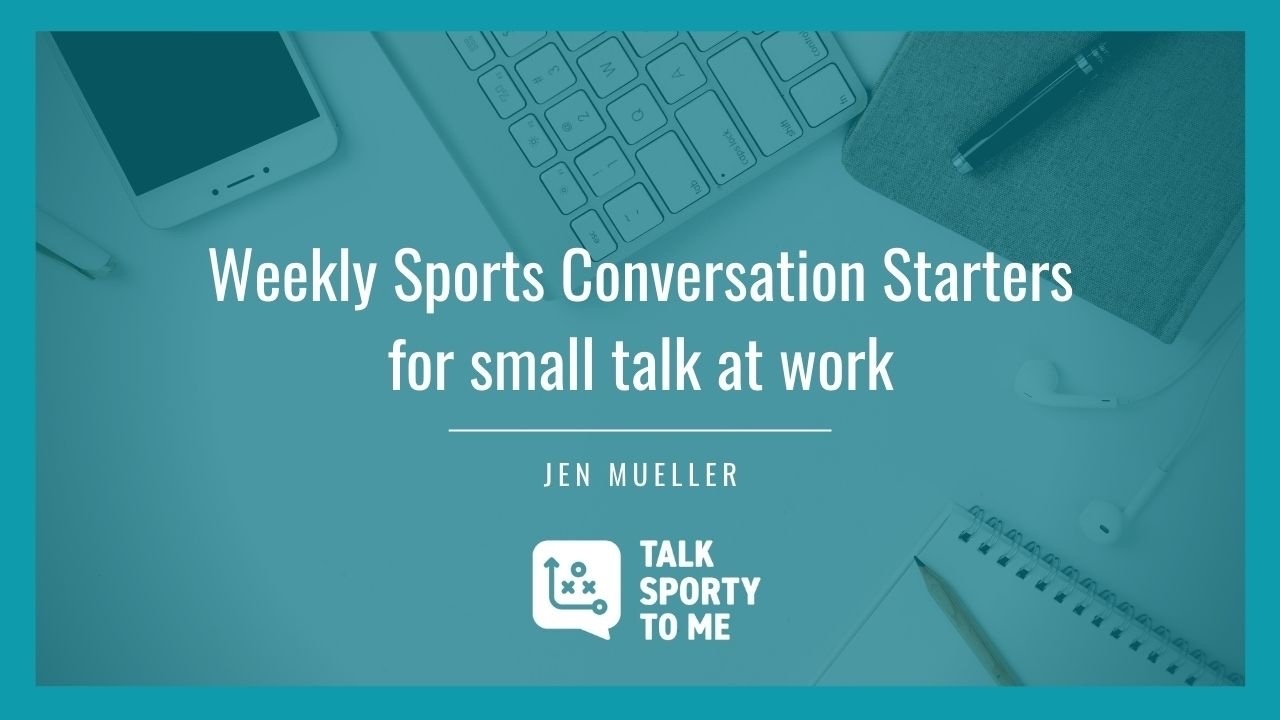
It’s been a while since I offered specific instructions on how to use this weekly email. In a nutshell, you scan the list, pick a topic and start a conversation.
If you’re not sure how to get the ball rolling, trying picking one topic and asking a yes/no question. For example:
- “I noticed the Australian Open starts today. Do you follow tennis?”
- “How about that playoff win for Cincinnati! did you see the game?”
Don’t be afraid of yes/no questions, they’ll help you get to a compatible conversation topic faster. Plus, when you engage with a sports fan they’ll fill in a lot of the blanks in the conversation.
Which one of these will you use this week?

Sports Conversation Starters for Your Workweek

The Seahawks closed out their season yesterday… and then depression set in.
I quote that line from Stripes somewhat jokingly at the end of football season every year. I get grumpy when the season ends. I miss practices, game day, game prep, my guys and my colleagues.
All I want to do is be grouchy for a couple days before I regroup and start looking ahead.
What I don’t want are fans trying to make me feel better by saying “at least baseball season is just around the corner.” I’m not looking for a silver lining. I’m not interested in talking about baseball in January and I don’t care that you’re excited about baseball season.
That might sound harsh, but this is a bigger conversation skill that sports can help you practice – empathy. Letting someone feel their feelings without jumping in with your own. Allowing someone to feel frustrated, disappointed, upset or sad without offering a reason they shouldn’t be. It might seem like a little thing in the context of a sports conversation ...
Sports Conversation Starters for Your Workweek

Establish relationships before you need them.
Practice your conversation skills before they’re necessary.
It’s easy to focus on productivity and the need to get things done heading into a new year and coming off the holiday break. Being productive doesn’t just mean powering through tasks. Don’t overlook the impact other people have on your ability to get things done. The relationships you build (or don’t) affect your productivity. Its why small talk is important and something to prioritize.
Be intentional about striking up conversations with colleagues, clients and employees. If you’re looking for things to talk about these sports headlines can help.

Talk Sporty 101: Start with Sports
Sports is always my go-to conversation starter. Even if I don’t know if I’m talking to a sports fan. I know that uncertainty can make some fans uncomfortable, but sports is truly one of the most efficient ways to spark small talk because the answer doesn’t matter nearly as much as the clarity it provides.
If I lead with “Did you see the game last night?” I know I’m going to get one of two answers, and quite honestly I don’t care which one it is. If the answer is “Yes” I know I can follow up with another sports question or a question about the game. If the answer is “No” I can ask something like, “What did you have going on last night?” And now I’m into a conversation without playing 20 questions or asking a handful of questions while trying to find something meaningful. Using sports as a starting point made it easier to make a connection and have a productive exchange.
Here’s something else to keep in mind: Asking “Did you see the game last night?” doesn’t mean that I had to see the...
Sports Conversation Starters for Your Workweek
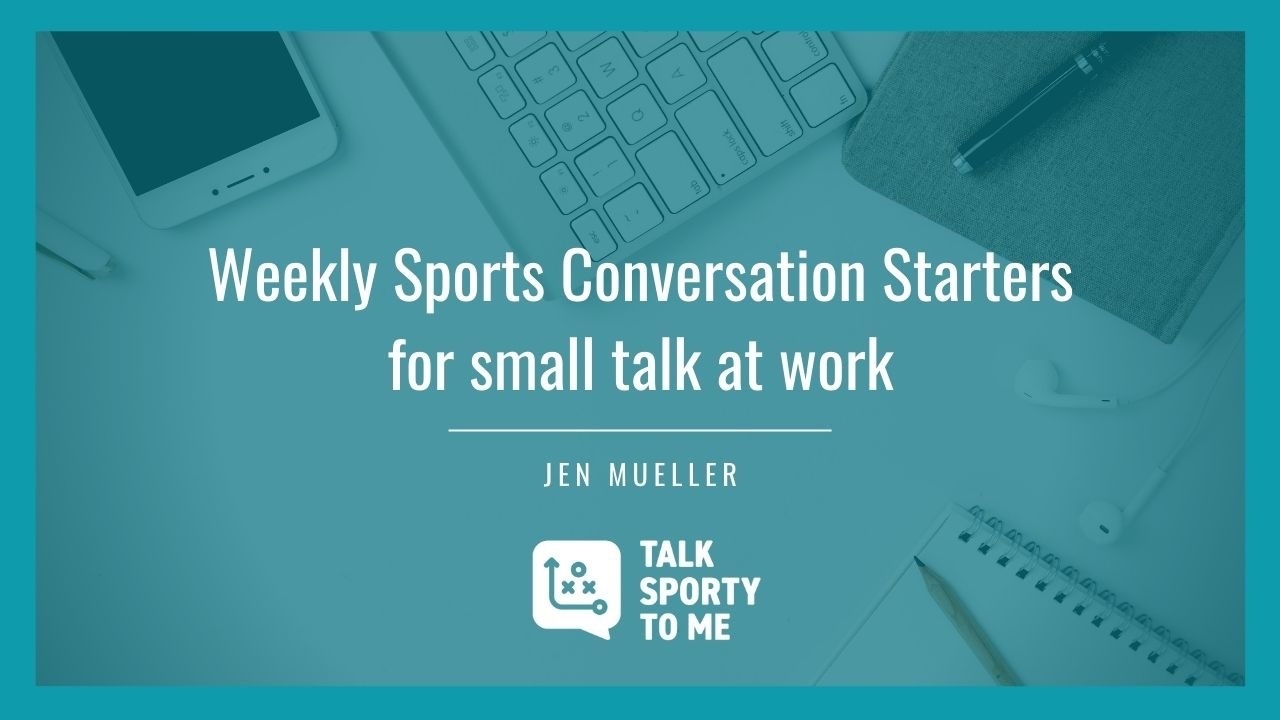
This is the time of year for goal setting and predictions. Most people are either making New Year’s resolutions or predicting what will happen in the coming year. For example: Tom Brady will retire in 2022. I’m not saying I agree with that one, but it’s possible….
Here’s what I’m going to throw out there – resolve to get better at small talk and I can correctly predict you’ll become a better communicator. Small talk, as unimportant as it seems, gives you a chance to practice thinking on your feet, talking to people you don’t know well and navigating uncharted territory in conversation. Being comfortable with being uncomfortable is a great skill to have as a leader and a communicator. Use these sports conversation starters to practice this week.

Talk Sporty 101: Generally Speaking
I’m a firm believer in preparing for little conversations like small talk because a.) I want my interactions to be productive b.) I don’t want them to be awkward, especially if I’m trying to build a relationship.
Preparation can range from doing a little research on people I’ll encounter, identifying success statements I can use in response to “How are you?” and having a few general questions in my back pocket to start a sports conversation. Here are some examples:
- Who’s playing tonight?
- Are you going to watch the game tonight?
- Where did you watch the game?
- Did you see the game last night?
- Is that the game you expected?
They’re canned questions that can get a timely response. I think of these as really generic questions and while I typically advocate for asking specific questions that get you closer to your conversation goal, these questions work just fine at starting a conversation.
BUT… your goal probably isn’t just to start a conversation. You’re not just trying to fill ...
Sports Conversation Starters for Your Workweek
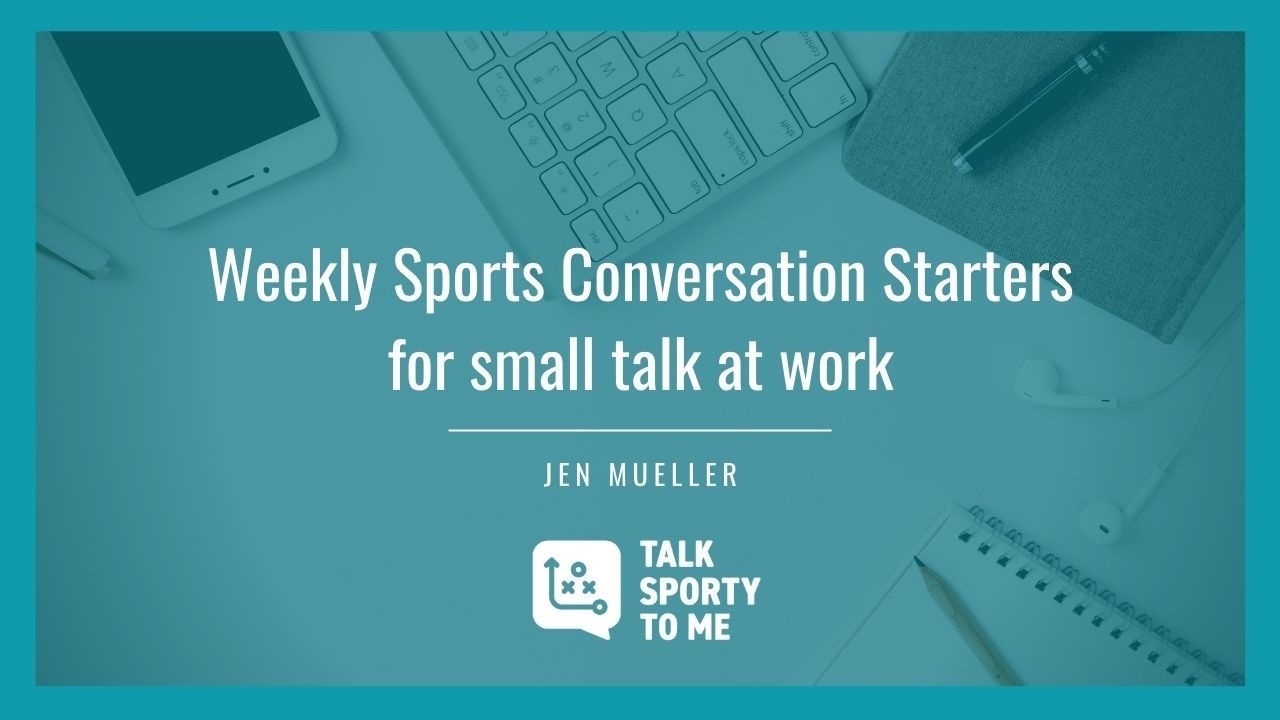
The two most obvious stories grabbing headlines this week are Christmas and COVID. Now seems to be a good time to offer a gentle reminder to make good choices with your conversation starters this week, especially if you’re around family. Just because something is making news doesn’t mean it makes for great conversation at the dinner table.
Even sports headlines are challenging these days, because of the prevalence of COVID. I won’t be the one to tell you not to talk sports, I will be the one who says try to stick to sports, or a safe “sports adjacent” topic to keep the Christmas spirit and family conversations on track.
Here are a few headlines you can use for sports small talk if you choose to go that route.

Sports Conversation Starters for Your Workweek
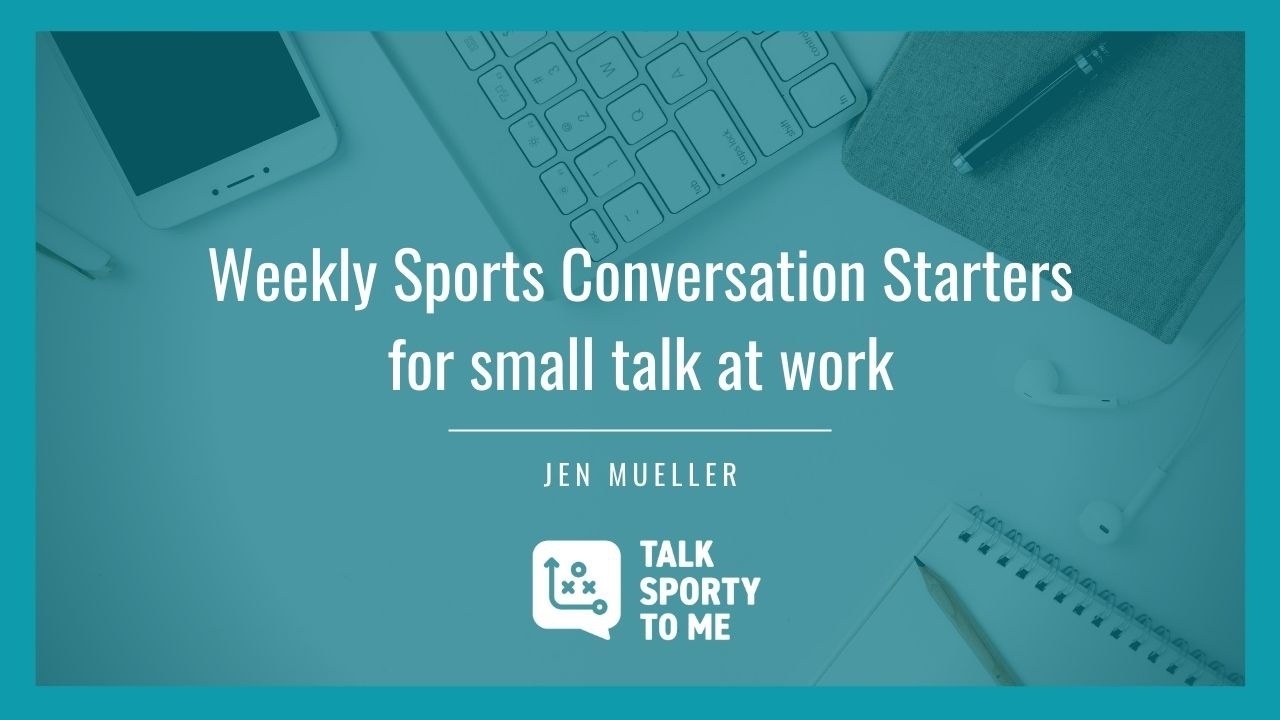
I feel fortunate when my work travel schedule takes me back home and gives me a chance to see family. That’s what happened during the weekend when I was in Houston. Each family member I talked to – including my 4-year-old nephew – talked sports to me, regardless of their true interest in Seattle sports. I work in sports. I was in town for a game. It makes sense they would use sports as a conversation starter.
It also makes sense that people would start sports conversations with you when they know you’re a sports fan. Use can use these sports conversation starters to indicate you’re a sports fan. You don’t have to engage in long conversations, just mention them in small talk. Even if there are no follow up questions, debates or interactions you’re setting the stage for future interactions.
Don’t be shy, these topics are making news around the sports world this week.

Sports Conversation Starters for Your Workweek
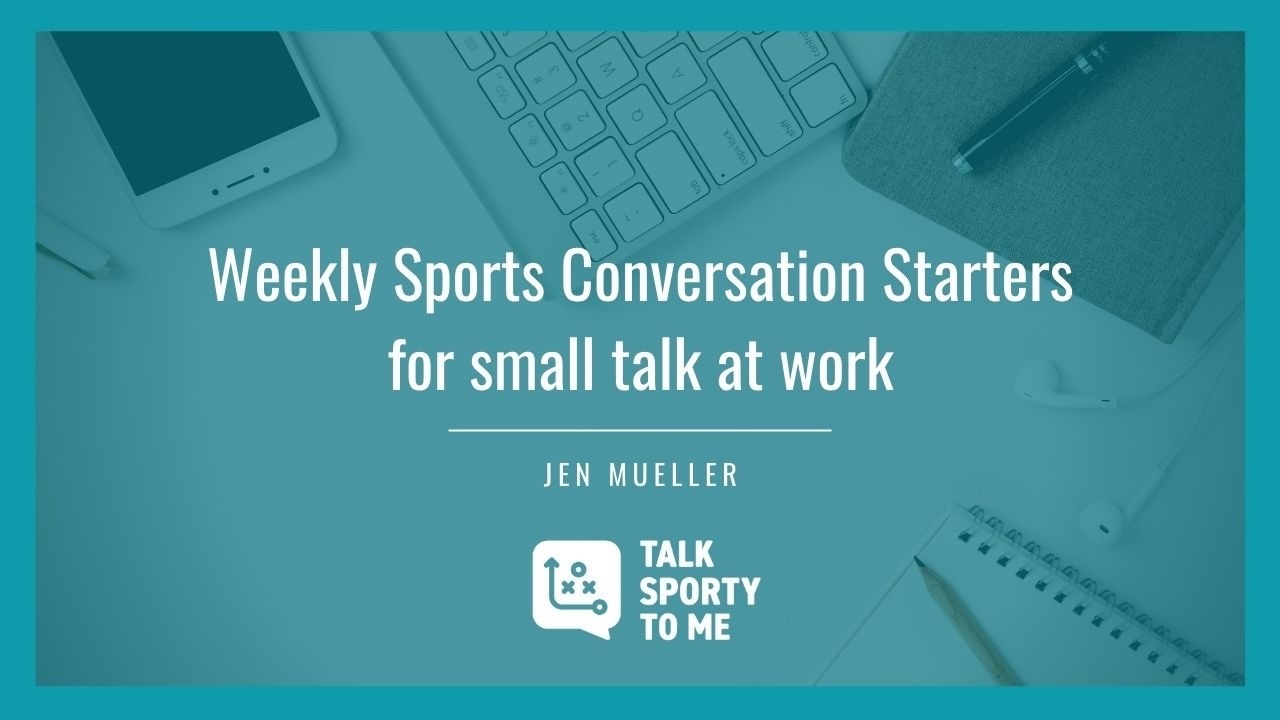
I’ve taken a fair amount of grief from my family in the last week over my Christmas list. According to them, it’s too short. The way I see it, having fewer options makes it easier. Limiting options narrows the focus and takes the guesswork out of next steps, which in this case is what to buy for Christmas.
The same thing is true when it comes to sports headlines. There are hundreds of sports headlines you could choose to talk about. That’s the great thing about sports but it can also be overwhelming. It’s why narrowing your focus to just a few topics makes the next steps – using them in conversation – easier. Here are a handful of sports conversation starters that take the guesswork out of sports small talk this week.

Conversation Starters for Your Workweek

You could spend this week asking everyone what they did for the Thanksgiving holiday, what they purchased on Black Friday and if their Christmas decorations are up.
But if you get tired of that conversation track try sports small talk and these conversation starters.



